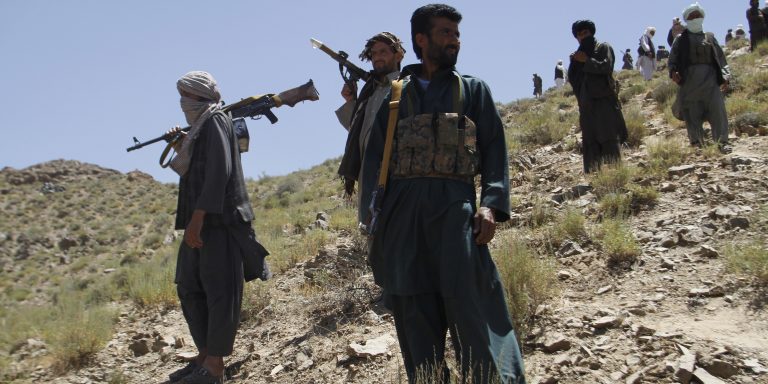INTELBRIEF
June 4, 2021
IntelBrief: “I Can’t Quit You Baby”: Relationship between Afghan Taliban & Al-Qaeda Remains Strong

Bottom Line Up Front
- A new UN report indicates that ties between the Taliban and al-Qaeda remain strong and could grow stronger following the U.S. troop withdrawal.
- Many remain skeptical that the Taliban possesses either the will or the capability to prevent al-Qaeda from rebuilding an external operations unit.
- If Afghanistan descends into chaos, the Taliban-al-Qaeda relationship could grow even stronger, with the former in need of the latter’s manpower and expertise.
- Al-Qaeda is facing a pivotal moment, but the resurrection of a safe haven in Afghanistan would be a boon for the group’s operational capabilities.
A recently released report by the UN Taliban Sanctions Monitoring Team confirms what many in the counterterrorism community have been warning about — ties between the Afghan Taliban and al-Qaeda remain strong and could grow stronger after the United States completes its troop withdrawal. The report states that al-Qaeda senior leadership remains based along the Afghanistan-Pakistan border, where it maintains a close working relationship with al-Qaeda in the Indian Subcontinent (AQIS). Previous UN reports have suggested that AQIS fighters regularly embed in Taliban units on insurgent operations in Afghanistan. The relationship remains strong, and al-Qaeda is positioning itself to take advantage of the opportunity presented by a U.S. and Coalition troop withdrawal. The report also specifically referenced al-Qaeda’s strategy of “strategic patience,” in which the transnational terrorist group would wait for an unspecified period of time before it resumed plotting attacks against international targets, including those in the West.
In testimony before the Senate Foreign Relations Committee several weeks ago, U.S. Special Representative for Afghanistan Reconciliation Zalmay Khalilzad said, “We will hold the Taliban accountable to their commitments to prevent al Qaeda or any terrorist group from using Afghanistan as a base for attacks against us.” Indeed, implicit in the agreement between the United States and the Taliban, Afghanistan is not to be used as a launching pad for transnational terrorist attacks. Yet, many counterterrorism analysts remain skeptical that the Taliban possesses either the will or the capability to prevent al-Qaeda from rebuilding an external operations unit. The UN report states that there has been “no material change” to the relationship between the Taliban and al-Qaeda; furthermore, the relationship has in many cases “grown deeper as a consequence of personal bonds of marriage and shared partnership in struggle, now cemented through second generational ties.” Some have dismissed Khalilzad’s framing of the Taliban-al-Qaeda relationship as wishful thinking, naivete, or willful ignorance. Others have labeled it deliberate misdirection in order to secure a resolution that expedites a U.S. exit from Afghanistan. It is likely not lost on the Taliban, or al-Qaeda, that with no troops on the ground, Washington will find it increasingly more difficult to monitor and address threats in Afghanistan as they arise. In recent weeks, the U.S. has struggled to find a willing partner to host an American base that would form an integral part of its offshore counterterrorism strategy.
One of the most foreboding sections of the latest UN report was the section detailing the opposition of key Taliban figures to the current peace deal. Both Sirajuddin Haqqani and Mullah Mohammad Yaqub Omari, deputy leaders of the Taliban and key figures in its military apparatus, oppose negotiations and favor a military solution. In that scenario, the Taliban would be even more inclined to maintain its relationship with al-Qaeda and would need al-Qaeda’s manpower and expertise to prevail against its adversaries within Afghanistan, which would include fighting against the Afghan security forces. If the Taliban decides to launch a full-scale military offensive throughout Afghanistan once the United States withdraws, the country will descend into chaos, which will lead to an enabling environment for transnational terrorist groups — not just al-Qaeda but also the Islamic State. The Islamic State Khorasan Province (ISKP), which remains at odds with both the Taliban and al-Qaeda, has still managed to conduct devastating attacks in Afghanistan, even as its overall organization has been weakened over the past year. ISKP repeatedly seeks out sectarian targets in an attempt to repeat the playbook successfully employed by Abu Musab al-Zarqawi and al-Qaeda in Iraq.
As an organization, al-Qaeda is at a pivotal moment. Two decades after the attacks of September 11, 2001, much of the organization’s top leadership has been killed or captured. Its current leader, veteran jihadist Ayman al-Zawahiri, is believed to be in poor health; rumors have swirled recently of his death, though to date these rumors have not been confirmed. The group’s next likely emir, Saif al-Adel, is living in Iran, being watched closely by Iranian authorities. Another al-Qaeda senior leader, Abu Muhammad al-Masri, was killed in Tehran in August 2020, allegedly by Mossad agents operating undercover in Iran. Numerous al-Qaeda branches and affiliates remain strong, including high-profile franchise groups in sub-Saharan Africa, but the organization has grown more decentralized as command and control has been attenuated by an aggressive U.S. counterterrorism campaign. Accordingly, the timing for al-Qaeda is crucial — the resurrection of a safe haven in Afghanistan under Taliban protection could give the jihadists the operational space necessary to recruit, rearm, and rebuild a robust transnational network. This reach could extend not just in South and Central Asia but could also involve redoubling outreach to affiliates in the Levant, the Arabian Peninsula, the Maghreb, and the Caucasus.